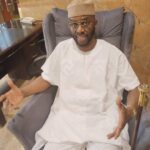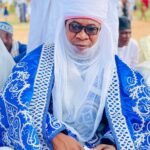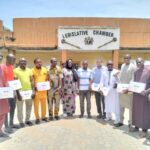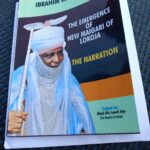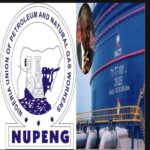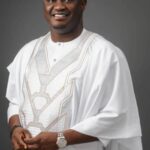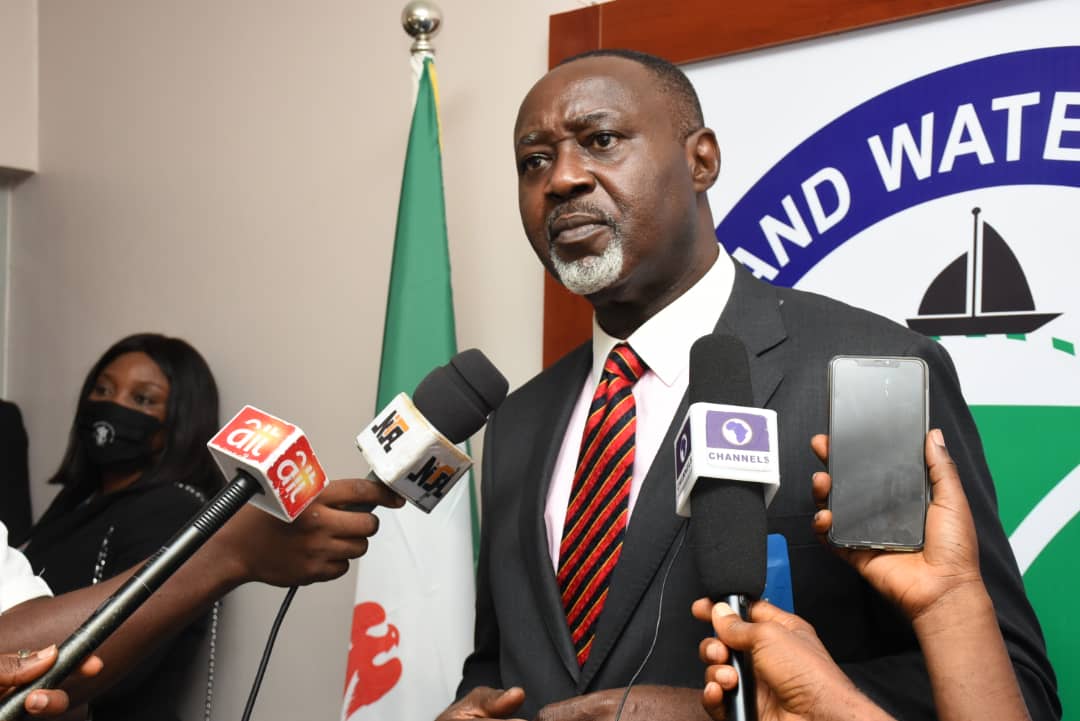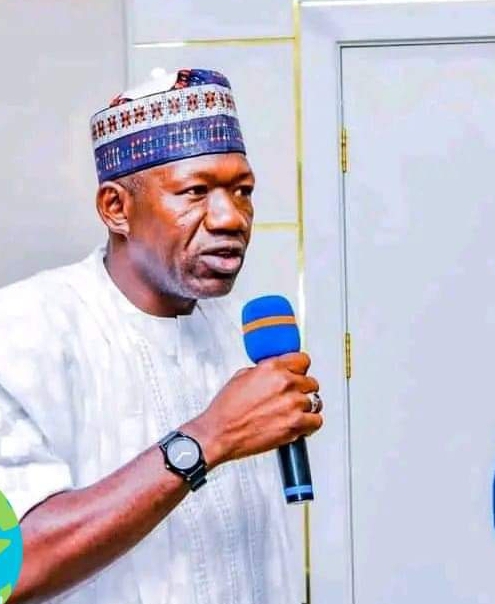By News Desk
Managing Director of National Inland Waterways Authority (NIWA), Chief George Moghalu, was a guest of President Muhammadu Buhari at the Aso Rock Preaidential Villa on Thursday as the government prepares to wind down.
In this interview with newsmen after a closed-door meeting with Mr. President, the NIWA MD asserted that his agency is doing everything possible to prevent flooding during this year’s raining season; or to mitigate the the damage that usually come with flooding where total prevention becomes impossible. Our Correspondent was there.
What challenges do you face as an agency in trying to execute your mandate?
Yes, there may be challenges, but challenges are there for man to overcome and we’re doing our best with the support we’ve been receiving from Mr. President and from our ministers and our ministry, leaders in our ministry, Permanent Secretary, everybody. We have been achieving reasonable successes and we intend to sustain it until we actualize our desired ambition, which is to ensure that our waterways are all year round navigable to ensure that the potentials that abound in that sector of the economy, the maritime sector, is kind of explored and exploited for the benefit of our people.
The rains are already here, what are you going to do to ensure flooding does not occur this year?
Yes, I agree with you that challenge is there. Proactively, what we are doing is to first of all sensitize the people, identify the critical areas and get people to know what will happen with time. With regards to clearing, yes, water hyacinths are being cleared on a regular basis, wrecks are removed, channels that are blocked, we do everything we can, within the limits of our resources to open up those channels so that we can have easy flow of water during this period.
What about the wrecks?
Yes, I said earlier that wrecks, even floating debris are all being removed at various locations across the entire country, as we identify them, we do the basic survey and once we identify them, we set the process in motion to remove them. We’re doing some now as we keep identifying them, and you know these things like water hyacinth, like wrecks, like floating debris, are not fixed items that you will say ‘I will remove now and it won’t be there again. You can remove a wreck tomorrow and by next tomorrow, another wreck will come. What are these wrecks? Broken down vessels that are condemned, logs and what have you. So as we identify them, using survey, identify the coordinates, the next thing we do is to set in motion the process of removing them.
As we speak, procurement processes have been concluded and some are being removed while as we identify, we set in motion the process of removing. We see them as a challenge and we are attacking them.
There are concerns over the National Water Ways Bill as the 9th NASS will be winding up soon.
National Assembly winding up does not mean that the country is winding up, it’s a continuum. If they are not able to finish whatever they have to do this time around, the next Assembly will continue and complete it. The important thing is that bills that are meant for the benefit of our people will be looked at from that perspective and addressed. If this Assembly can’t finish it, the next Assembly will continue, that’s why government is a continuum.
Annual flooding, what are you doing to ensure we don’t have the kind of humanitarian crisis we had last year?
Yes, it’s of a great concern. Like you talked about what happened last year, it was of great concern to us as an agency of government that has something to do with water and flood. So what we started doing proactively was first of all to start aspects of sensitization, getting people to understand because we have a department in our office that monitors flood flow, looking at the floodplain and giving us report on a monthly basis or bi-weekly basis, to my office and then the department that is responsible will now develop the data, which we’ll now use to sensitize the people, keep them informed of the possible flood-prone areas so that people will have to leave those locations.
While at the same time also, like you may be aware, we have 23 area offices across the country. So what we are doing, in terms of opening of blocked channels, is using the area offices across the country, identifying those areas where we have blocked channels and then within the limits of our own resources and capabilities, we start opening them up so that they have free flow of water.
Do you have the resources to do capital dredging?
Like I did say the last time I spoke to the media and it was here the question was asked, the resources available for you to do massive capital dredging is not there. What we’re doing is to use the resources we have to do what we call maintenance dredging, that is opening up channels, deepening channels where we have information, based on the statistical report from our department where we have such blockages and then we keep doing what we can do to ensure that these channels are open all year round.
When I started I said one of our primary responsibilities is to make sure that our channels are all year round navigable and that means opening them up to the extent that vessels can move around across the country.
Talking of resources, how much do you have on ground for this year?
All the resources, all the money available for NIWA this year is not all dedicated to dredging or to opening up of channels. There are other issues that take up resources; human capital development, development of infrastructure, building new jetties, building new ramps across the country and then getting vessels also and putting them to effective use.
So what we’re doing is as much as we have, we try to prioritize, but the important thing is that the key aspect of it is the human, the Nigerian, what affects them more, of what gives us opportunity for more benefit. So we look at that primarily, the Nigerian is the key here. So we addressed that primarily and the interest of the average Nigerian comes before every other interest, as far as it has to do with our own planning and our operations.
When you are doing these prioritizing, do you consider River Niger and River Benue, especially about the sand blocking the waterways?
If you will take note, not too long ago, about two, three weeks ago, the river chart for Benue, down to bifurcation, the first phase of it was launched, a few weeks ago. That’s an arrangement we have, it’s a collaboration between National Inland Waterways Authority, the Navy, being supported by NEXIM Bank, on the instrumentality of Sea Link Project.
When we talk about inland waterways in Nigeria, you will not lose sight of the fact of the positioning of River Benue and River Niger, these two are the major rivers in our country and that whatever we’re doing is around these two rivers, even the jetties we’re building or the ports we’re building, like you have a port in Onitsha completed, you have a port in Baro completed, the one in Lokoja is ongoing, not yet completed, the one in Oguta is not yet completed. We just started the Environmental Impact Assessment for the one in Makurdi.
So you find out that all these jetties and all these ports are all in line with the issue with River Benue and River Niger. We’re very concerned about that, we’re very conscious of that and whatever we’re doing, we have that at the back of our minds.
Thanks he security implications
Nigerians have expressed concerns about the National Waterways Bill. Should Nigerians be really concerned, is anything wrong with the bill?
The position of NIWA, as it has to do with the bill, has been transmitted in writing to the ministry, but the point here is that the National Assembly are made up of Nigerians and they are representing various communities and constituencies in the country. So for me, there is no issue that cannot be discussed. If there are concerns raised by various groups, certainly it has to be addressed for us to come up with a bill that is universally acceptable by everybody. So if there are concerns, I’m sure that National Assembly will look at it and then address the issues as they arise.


